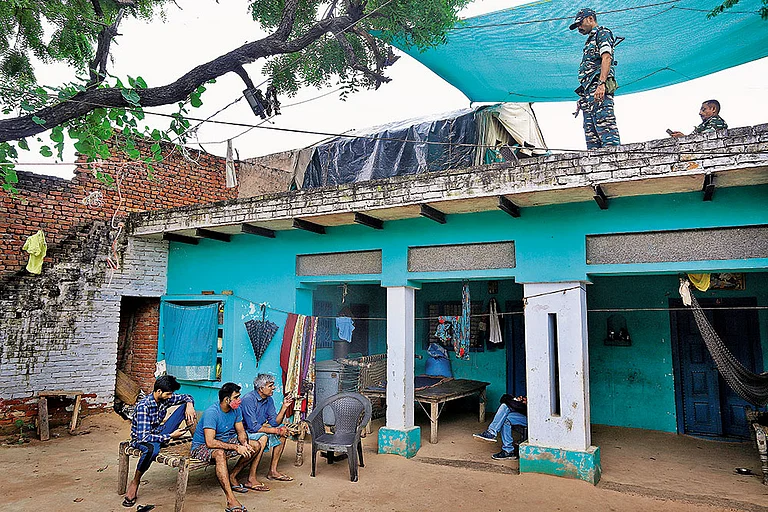As the 2024 Lok Sabha elections draw to a close, a wide range of electoral issues have emerged. Among them, the farmers’ community is raising the loudest voices, with many calling for a change in government.
Pushed To The Brink: Stray Cattle, Flash Flooding, And Repeated Losses Plague Farmers In Uttar Pradesh
Despite the BJP government's claims that the only castes they believed in were women, farmers, youth, and the poor—and their pledges to uplift these groups if re-elected—the farmers remain unconvinced.
Since the government failed to deliver on its promises following the 2021 farmers' protests, the nation’s farmers have been increasingly discontented. Despite the BJP government's claims that the only castes they believed in were women, farmers, youth, and the poor—and their pledges to uplift these groups if re-elected—the farmers remain unconvinced.
Under the unforgiving blaze of the sun, as temperatures soar into the alarming forties, the farmers of Barabanki in Uttar Pradesh can be found toiling on their fields. As night falls, they head home for a short break, swap their ploughs with lathis and return for the second shift of the day - a mission to keep stray cattle away from the crops.
“Din bhar kheti karo phir raat bhar chaukidaari karo, danda lekar hat hat karke gaaye ko hatao (First we have to work on farms all day and then at night we have to guard our farms from the stray cattle),” Karpiya resident Shivdulari says as she squats by the side of her peppermint fields.
Four of her seven children assist her on the farm and have divided their duties, taking turns keeping watch at night. “It's not just our family, the entire village is out late at night,” she says.
"Jo soya woh khoya," she says, attempting to lighten the mood. Yet, her tanned skin and the deep creases under her eyes reveal the underlying worry and exhaustion.
The Barabanki constituency, situated about 30 km from Lucknow, thrives on its agricultural economy. Beyond its chief crops of wheat, rice, and maize, Barabanki is renowned for its peppermint and opium farming.
In addition to the stray cattle problem, which has become a central issue for Barabanki’s farmers, the fluctuating prices of peppermint oil are also making it difficult for them to stay afloat.
Congress candidate from Barabanki Tanuj Punia says one of his priorities if he wins elections would be to ensure peppermint oil has a Minimum Support Price which is profitable to the farmers.
“A lot of peppermint is grown here. The rate of peppermint oil fluctuates a lot like the stock market. We have to ensure that the MSP for the oil is increased so it's profitable to people,” he said in a conversation with Outlook.
About 300 km away in Budaun’s Sahaswan, farmers are grappling with a different set of challenges. In Bela Beswara, a cluster of villages home to around 60,000 people, the proximity to the Ganga River brings a unique problem. During the rains, the river swells, flooding the entire area and cutting it off from the mainland. The farms become submerged, destroying the crops.
The local farmers who have endured repeated losses over the past few years, have been forced to abandon agriculture for other professions such as woodcutting or manual labour.
“Ek fasal hoti thi baisakhi ki ab toh woh bhi ganga le jati hai,” Roshan Bi, a local of the village says.
Model Village Trust coordinator Ajmal Husain who has been working for the upliftment and development of Ismailpur village in Bela Beswara says the farmers in the area were already below the poverty line, consecutive losses made their survival a challenge.
“People here have small fields, no one even owns a proper-sized land in the entire village. Two bigha, four bigha, maximum 10 bigha on which they do their cultivation. Whoever has 10 bigha is a king here,” he says.
In Uttar Pradesh’s Kaushambi, the situation of farmers is not much different. Seated under a Neem tree on a sultry afternoon, Dhara Singh of Kaushambi’s Charwa village puts forth his grievances,
“Since 2014, the plight of farmers has just deteriorated and capitalists have only become richer. We are just getting by, every year we go more into debt,” he says.
Other farmers seated beside him join in, “cattle are destroying everything”, one of them says, while another complains about the drop in the amount of urea being given to farmers by the government, “it used to be 50 kg, it’s 40 kg now.”
“If someone relies on farming for their livelihood they won't be able to afford two meals a day, won't be able to buy clothes to wear,” Rajesh Kumar Yadav, one of the disgruntled farmers says.
“For this reason the farmers community is seeking change in government,” he added.
